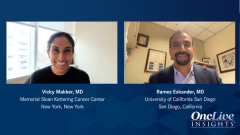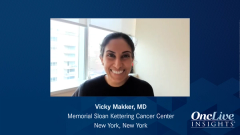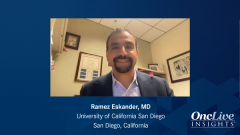
First-line Treatment Options for Advanced Endometrial Cancer
A comprehensive overview of first-line treatment options for patients with advanced endometrial cancer.
Episodes in this series

Transcript:
Vicky Makker, MD: Should we talk a little bit about how we define first line, second line [and] adjuvant therapy?
Ramez Eskander, MD: Yes. I love this conversation because I feel like we’ve adapted the dialogue from ovary just historically and we’ve incorporated it into all of our disease sites as we give systemic therapy, whether it be endometrial or cervical cancer. In my mind, this premise of first-line and adjuvant go hand in hand and I know that’s not the case for some other solid tumor types. In the gynecologic cancer space, we think of first-line or adjuvant therapy is that therapy that accompanies primary management whether that’s following surgery, or in some cases, in patients who have widely metastatic endometrial cancer with neoadjuvant therapy, and then surgery and then continuation of systemic therapy. For me, second line is the first regimen at recurrence. If they’ve had prior therapy, it would be second line. Now if a patient in practice received a surgical intervention, did not receive chemotherapy in initial management, and then developed the recurrence and was receiving chemotherapy, that would be first line of chemotherapy at recurrence. So there’s some nuances there, but I think really in clinical practice much of this was just adopted from the terminology we use in the GYN [gynecology] cancer space for some of our alternate solid tumors. I’m not sure if you guys use that same terminology or not by convention.
Vicky Makker, MD: Yes. It’s definitely a conundrum and definitely comes up all the time and I think as a corollary, the other thing that comes up, since you’re talking about borrowing from the world of ovarian cancer, is this whole concept of platinum sensitivity vs resistance. A concept that has never been prospectively evaluated in endometrial cancers and I think it’s largely an advent of the fact that up until recently, we didn’t really have great therapeutics in the second- and beyond-line settings. So definitely methodology and terminology that hasn’t been validated in endometrial cancers but is still widely used in terms of when to have platinum re-challenge with combinations that are available.
Ramez Eskander, MD: So it takes us I think perfectly into this evolution of this conversation. What do you guys use most commonly as your treatment of choice for first-line systemic therapy if a patient is not being treated on a clinical trial?
Vicky Makker, MD: Absolutely. So I think you hit it. The first and foremost thing that we think about is a clinical trial and as you know, there are a number of really important frontline chemotherapy plus checkpoint inhibitor, plus or minus other targeted therapy trials. Even a nonchemotherapy approach of a VEGF [vascular endothelial growth factor] TKI [tyrosine kinase inhibitor] plus checkpoint inhibitor that are definitely expected to change the frontline standard of care and advanced endometrial cancers. If not for all comers, maybe for specific molecular phenotypes. So a lot of exciting data that will unfold soon. But yes, I think if there isn’t a great clinical trial then based on GOG209 showing that paclitaxel/carboplatin was non-inferior to a 3-drug regimen tap. That really is our go-to chemotherapy backbone for our average endometrial cancer patient that needs chemotherapy. Certainly, we do HER2 testing here as a routine as we’ve talked about and so for those that are HER2 amplified or HER2 overexpressed based on the randomized phase 2 trial of carboplatin/paclitaxel plus or minus trastuzumab. Dr [Amanda Nickles] Fader’s very exciting data showed a PFS [progression-free survival] improvement in patients with both advanced stage and recurrent endometrial cancers and also an OS [overall survival] benefit for those that had advanced stage endometrial cancers. We are routinely now using carboplatin/paclitaxel/trastuzumab in patients that are HER2 amplified or overexpressed. And then the chemotherapy plus VEGF monoclonal antibody experience is mixed but certainly based on GOG86P, there was not an improvement in PFS compared to the GOG209 control. So while we do use bevacizumab with chemotherapy in select patients, such as those that have effusions and/or ascites, our general regimens are carboplatin/paclitaxel or carboplatin/paclitaxel/trastuzumab in the HER2 amplified patients. What’s your approach at your center?
Ramez Eskander, MD: Very similar to what you just reviewed so wonderfully. I think when we approach it, I like to think about the frontline strategy is exactly as mentioned. If there’s a clinical trial, wonderful. If not, the regimens that you mentioned. I think an area that’s really evolved, and I bring it up a lot in practice when the fellows or the residents are with me in clinic, I say not long ago, we had very limited options to offer our patients and unfortunately, many of those patients succumb to their diseases because we hadn’t yet understood the biology of the tumor in the way that we do today. But when I think about recurrent disease, I think about what we reviewed just a little while ago, which is what is the molecular drivers? What do we know that exists with the tumor? And this highlights the importance of getting that molecular tumor testing to inform treatment strategies. The disease site agnostic approval of pembrolizumab in the mismatch repair deficient [dMMR] population based on KEYNOTE-158 and the endometrial cancer cohort, which was the second most frequently accrued cohort, second to colorectal, showed an objective response in the dMMR patients of 57%. We had not seen anything like that historically and the median duration of response was not reached. When you look at monotherapy chemotherapy drug options in the recurrent endometrial cancer space post carboplatin/paclitaxel, we were talking about response rates of 10%, maybe 15%, and certainly not durable responses.
When we began to see this data emerge in the dMMR population, I think that very quickly altered the way we think about recurrent disease in that patient cohort. So thankfully for us and for our patients, when there is a mismatch repair deficient biomarker or MSI [microsatellite instability]-high, single-agent checkpoint inhibition with pembrolizumab or an alternate drug is an appropriate therapeutic option that can lead to long-term sustained remissions, and maybe, as we see in our practices, people responding for years maybe cure even in the recurrent disease setting. I think that the HER2 opportunity still exists in the recurrent setting. We all see patients who never received an anti-HER2 drug in initial adjuvant therapy and they come in with recurrent disease. And just like mentioned with Dr [Amanda Nickles] Fader and her colleagues’ clinical trial, we see efficacy there. So if there is HER2 overexpression then we can incorporate an anti-HER2 strategy with a chemotherapy backbone for that patient. To be quite honest, I don’t see NTRK fusions in my patient population frequently enough to say with experience that I have seen long-term responses or durable responses. We still look for them, understanding they’re rare, but the data—Dr [David] Hyman led the initial studies that showed really dramatic waterfall plots for these patients with targeted agents. In my mind, that’s what I go to and this is the setting where I really think the evolution of care has been transformed.
Transcript edited for clarity.









































